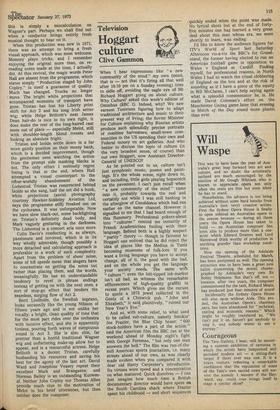Television
Hoggart culture
Clive Gammon
When I hear expressions like " a new community of the mind" my own (mind, that is — not that it's firing all that well after 10.10 pm on a Sunday evening) tries to sidle off, avoiding the eagle eye of Mr Richard Hoggart going on about culture. Why Culture? asked this week's edition of Omnibus (BBC I). Indeed, why? We saw earnest Tunisians figuring how to adapt traditional architecture and music to their present way of living; the Soviet Minister for Culture explaining why Russian artists produce such splendidly precise portraits of combine harvesters; small-town communities in the US spending their own and Federal money on art galleries. And who better to discuss the topic of culture (in the very broadest sense, of course) than our own Hoggart, now Assistant DirectorGeneral of UNESCO?
As he pointed out to us, culture isn't just symphonic music, poems and paintings. It's the whole scene, right down to, and including, little girls playing hopscotch on the pavement. I can't just recall' when "a new community of the mind" came into it, probably towards the end and certainly not while I was still basking in the afterglow of Casablanca which had run earlier on the same channel. However it signalled to me that I had heard enough of this flummery. Professional pokers-about into "cultures " remind me instantly of French Academicians fooling with their language. Behind both is a highly suspect " purity " theory — though in fairness to Hoggart one noticed that he did reject the idea of places like the Medina in Tunis becoming museums of folk-lore. If you want a living language you have to accept change, all of it, the good with the bad, and on the whole you get the language your society needs. The same wit'h "culture ": even the felt-tipped ink-marker isn't all bad, as witness the remarkable efflorescence of high-quality graffiti in recent years. Which gives me the excuse to quote a 1973 jewel collected in the Gents of a Chiswick pub. "John and Elizabeth," it said plaintively, "ruined our New Year's Eve."
And so, with some relief, to what used to be called sub-culture, namely Smokin' Joe Frazier, the Blue Chip boxer: "600 stock-holders have a part of the action" said the American film the BBC ran at the weekend ahead of Monday night's fight with George Foreman, "but only one man answers the bell." The film was run-of-the mill American sports journalism, i.e. many streets ahead of our own, as was clearly made evident when you compared it with dear old Harry Carpenter's introduction.
Its virtues were speed and a concentration on what mattered. Quick dissolves — I can just imagine how much time a British documentary director would have spent on the South Carolina shack where Frazier spent his childhood — and short sequences quickly ended when the point was made. No lyrical shots but at the end of fortyfive minutes one had learned a very great deal about this man whose era, we were shortly to learn, was ending.
I'd like to know the audience figures for ITV's World of Sport last Saturday Afternoon vis-a-vis the BBC's for Grandstand, the former having elected to run an American football game in opposition to Wales v England at Cardiff. Finding myself, for professional reasons, in North Wales I had to watch the ritual clobbering of England on the box and at the risk of sounding as if I have a piece of the equity in Bill McClaren, I can't help saying again what a splendid commentator he, is. He made David Coleman's effort on the Manchester United game later that evening in Match of the Day sound more plastic than ever.


































 Previous page
Previous page